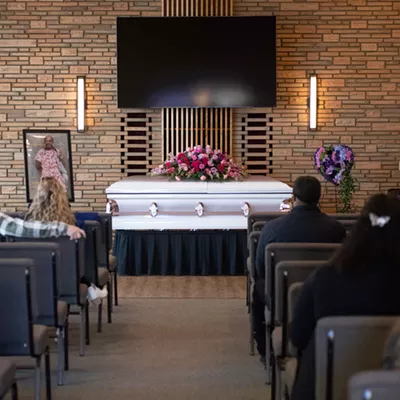Wednesday, July 29, 2015
Psych ward at Sacred Heart retains doctors, agrees to cut bed count by two-thirds
As far as reductions go, two-thirds is pretty significant. Imagine reducing your weight or your wardrobe or the time you spend sleeping by two-thirds. Crazy, right? Now imagine Spokane's only inpatient psychiatric hospital — which currently has space for 48 adults and 24 children experiencing acute mental health crises — reducing it's bed count by 66 percent.
You won't have to imagine for long; it's about to happen September 6. Providence Medical Group's Sacred Heart Hospital announced the reduction to 12 adult beds and 12 pediatric beds in a press release celebrating the retention of five of the seven doctors who had threatened to quit in June. "We have five right now that have signed contracts," says Providence's External Communications Director Elizabeth DeRuyter.
So why did all of Sacred Heart's seven psychiatric physicians turn in resignation letters in the first place?
"The issue was related to workload. The demand for psychiatric services is high and despite our best efforts to recruit and get more staff, we couldn't keep up with demand," says Providence Medical Group's Chief Medical Officer Kirk Rowbotham. "This was not about money, this was about lifestyle and workload."
The hospital plans to alleviate the workload problem by reducing the number of patients they take in, at least temporarily. Sacred Heart will "draw down" the bed count as they transition to a new model of care. By October, Providence hopes to hire additional doctors and begin bringing the bed-count back up. It could be touch and go for a bit, though, due to a national shortage of psychiatric doctors. The shortage of providers is felt more acutely in Spokane County, where 8 percent of residents have psychiatric needs, compared with a national average of 5 percent. "It's very difficult to recruit psychiatrists to the need that we have," says Rowbotham.
Sacred Heart is changing the way providers care for patients to a more team-based model in an effort to make the hospital more attractive to doctors. "We redesigned our program to make it more appealing. It's been very well received by psychiatrists, and we have three viable candidates, including one that's very close to signing a contract," says Rowbotham.
"The model to date has been physicians providing all the provider-level care. This new model will team physicians and nurse practitioners to work together. These nurses are specifically trained in psychiatry, they would work together in a team-based model so we're able to see more patients and work collaboratively," says Rowbotham. The hospital is still deciding the exact ratio of practitioners, but it will probably be around two-thirds doctors to one-third nurses.
As for how many beds at Sacred Heart currently have patients in them?
"Last I heard they had 19 on the adolescent side, and on the adult side, typically they run at capacity," says Rowbotham.
So where will the patients that the hospital doesn't have space for during the transition go?
"We'll do our best to support the people that we're able to support," says Rowbotham. "We're working with community partners to find care for people in either outpatient settings or potentially other hospital settings."
Sacred Heart doesn't just serve Spokane, though, and the whole eastern side of Washington has few other options for inpatient care. There's Eastern State Hospital, but acute care isn't their specialty, and even they rely on Sacred Heart when they reach capacity. "Kootenai has some adolescent service, Yakima has some adolescent service," says Rowbotham. "There are other facilities on the west side."
As in the west side of the Cascades.
DeRuyter says other community partners in Spokane — like Frontier Behavioral Health — will be able to provide some non-hospital based services, too. The new contracts will keep the doctors at Sacred Heart for one year.
Tags: news , mental health , Sacred Heart Hospital , doctor shortage , medical care , Eastern State Hospital , Providence Medical Group , psychiatric care , psychiatric physicians , Image















